When Dr Fiona Kerslake was growing up on her family’s farm in Tasmania’s Central Highlands, technology wasn’t something that was used in the day-to-day running of the 1000ha mixed-enterprise property.
“Everything was really quite manual,’’ Kerslake recalls. “If you wanted to turn on the pump, you had to drive up to the pump shed. If you wanted to check dam levels you had to drive out to the dam and do it, if you wanted to check that the stock had water, you had to drive out and check the troughs. And the rain gauge was one on the fence that you had to tip the water out of in the morning.’’
But the now 45-year-old says the evolution of technology since her childhood – in farming and also in society more broadly – has been “just incredible”.
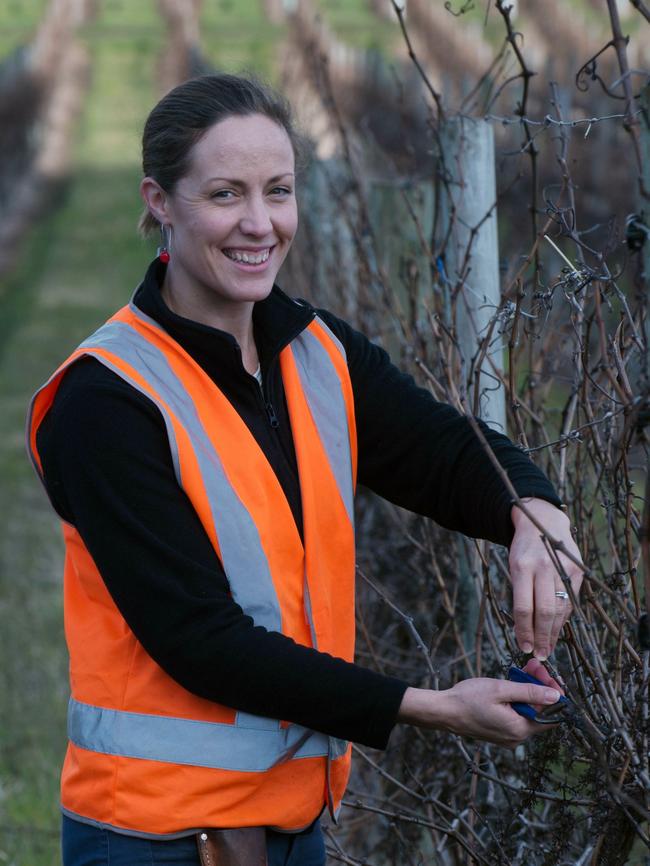
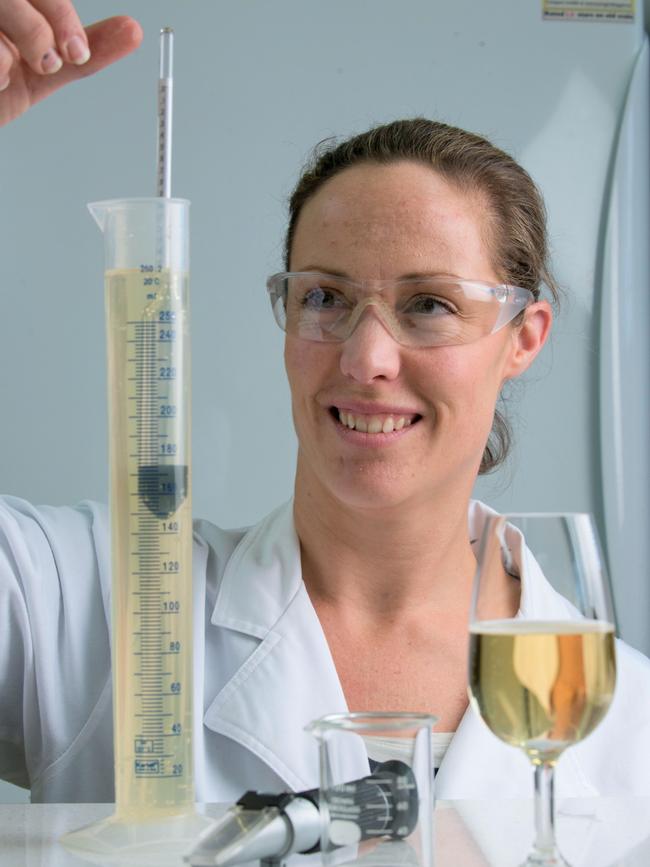
From soil moisture probes and remote monitoring of water levels in tanks, dams and stock troughs to self-driving tractors and drones for spraying crops, there are a raft of new and emerging technologies being used in various ways on farms in Tasmania and across the world.
And Kerslake – with her extensive experience as a researcher, academic and international speaker, as well as her work with two Tasmanian companies bringing IT and AI solutions to farmers – finds great satisfaction in helping farmers use technology in practical ways that can make life easier and produce better yields and better profits.
Now based in Launceston, Kerslake splits her time between two local businesses – she’s the business development manager for Ag Logic (aglogic.com.au), a Longford-based firm that provides a range of precision agricultural monitoring services and products to Tasmanian farmers; and she’s also head of agronomy for Bitwise Agronomy (bitwiseag.com), a Launceston-based AI agtech start-up delivering yield forecasting in high-value, intensive horticulture crops in Tasmania and worldwide.
In simple terms, she helps farmers identify the main problems on their property, and then comes up with – and implements – customised technology to solve these problems and make farm life run more smoothly.
She also acts as a go-between for farmers and software developers, ensuring that hi-tech software can perfectly meet the real-life needs of everyday farmers.
Some farmers are looking for technology that will make their lives easier and give them greater flexibility and freedom – like installing monitoring systems for irrigators, which allows irrigation to be turned on or off with the touch of a button on a smartphone app, and also ensure irrigators are working correctly without the need to physically drive around the farm and check.
Similar monitoring systems can also be used for checking levels on water tanks and dams, and ensuring stock have appropriate levels of water in their drinking troughs.
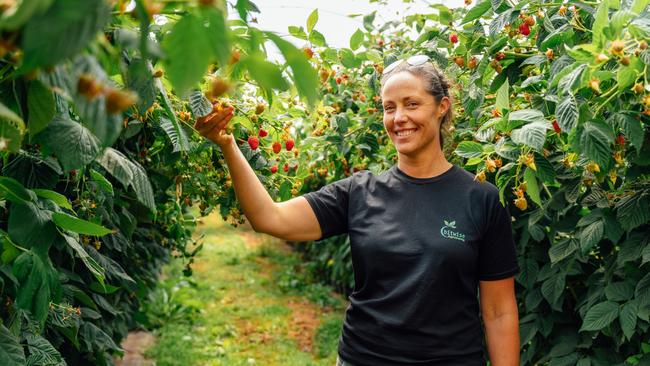
“Quite a few farmers use tech to bring a little bit more peace of mind,’’ Kerslake says.
“Just knowing that an irrigator is still going, that it hasn’t got bogged and waterlogged an area does provide that peace of mind.’’
She says traditionally a need for irrigation had tied farmers to the land, as they needed to be on site to turn irrigators on and off. But technology was providing more flexibility, enabling people to “hopefully get off the farm, go to kids’ sport, or have a weekend away at the shack” while still being able to monitor what was happening on the farm. Such technology is also useful for farmers who are managing multiple properties in different locations.
Some farmers are turning to technology in a bid to reduce the physical toll of manual labour.
“With something like auto-steering tractors, you’re making some really physically demanding jobs less demanding – with less physical wear on farmers they’re going to be less stressed at the end of the day,’' Kerslake says.
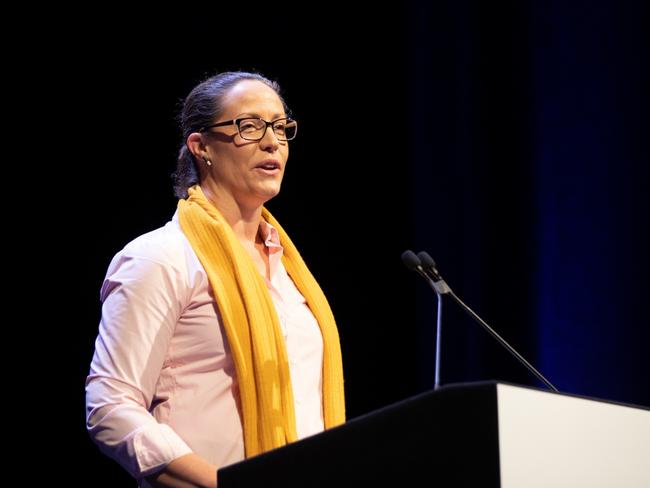
Using moisture probes, to measure the moisture levels in soil, also allowed farmers to see what was happening 1m below ground level without the cost and effort of sending a worker out every week to dig deep holes on various parts of the property to manually check moisture levels.
Kerslake says recent wet weather in Tasmania was a good example of how spraying via drones could be beneficial on farms, as heavy rainfall had made paddocks too boggy to use tractors. Spraying crops with a drone, however, would avoid the need for such heavy machinery.
Some farmers starting new enterprises, or expanding existing enterprises, are wanting to use technology to carefully plan their expansion to optimise things like water flow and drainage and improve risk management.
Someone who plans to install a new tech-savvy vineyard, for example, could use satellite technology to map their property, and ensure every post and vine goes in according to GPS accuracy to maximise potential and ensure better connectivity between underground and above-ground infrastructure.
Others farmers are looking for greater financial return – keen to use technology to maximise crop yields and profits – and artificial intelligence is being used to help with that.
Bitwise Agronomy encourages farmers to take video footage of their crops, using a GoPro camera, and then upload it to the company’s AI platform, called GreenView, which then breaks that footage down into frame-by-frame imagery, analysing those images and offering vital insights and yield forecasting which then allows farmers to start making data-driven decisions to improve yield and profitability.

The technology is being used in the wine industry, where data and yield estimations taken in vineyards at different times throughout the season can help produce a better crop for the annual harvest.
But Kerslake says it is even more valuable in the berry industry, where fruit is continually ripening and being harvested, as AI can estimate how much fruit will be ready to harvest on any given day.
The technology works by carefully identifying different stages of plant maturity, from flower to mature fruit and everything in between. It also takes into consideration the amount of time it takes to get from each stage – which changes throughout the growing season – and uses this data to make yield predictions, a time-consuming and arduous task that would traditionally have been done by farm workers counting fruit by hand and marking estimated numbers on a clipboard.
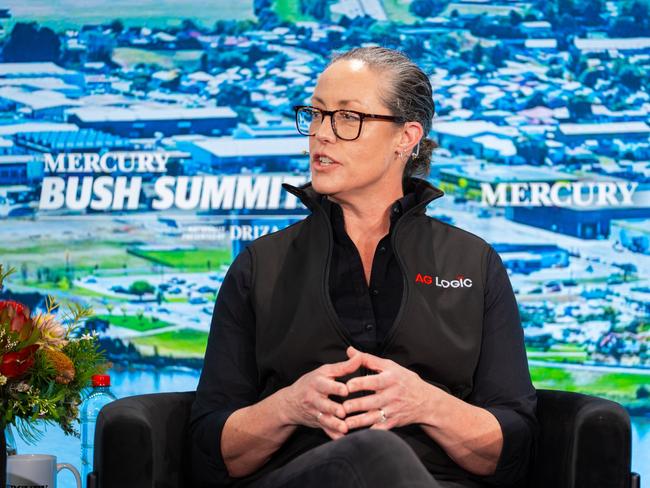
Kerslake says the other benefit of this sort of AI forecasting is that data can also be used in conjunction with other technology systems on a farm. Farmers might visualise that yield data on a map, for example, and identify areas where there are really low flower numbers, and then direct staff to that area to look at whether there are irrigation problems, or other issues that can be rectified using existing farm management systems.
Kerslake, who recently returned from a strawberry growers’ field day in California which attracted around 650 growers, says there has been more uptake of Bitwise Agronomy’s AI technology overseas than in Australia, with the technology already being used in South America, North America, North Africa, Europe and the UK.
Kerslake says agtech isn’t about replacing workers with machines, as people were still needed on the ground, but the technology enabled farmers to work smarter, not harder.
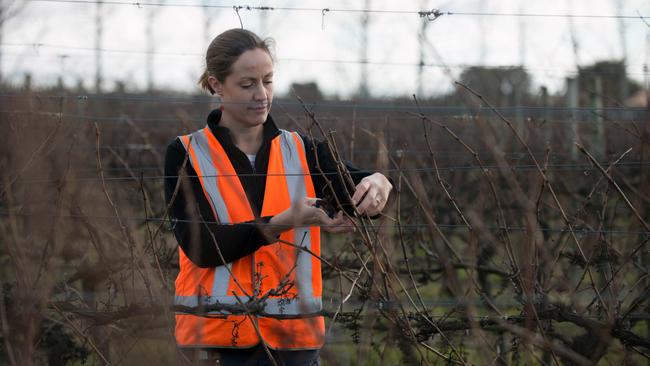
Reducing the need for repetitive, mundane tasks on the land could also help make farming a more attractive career prospect, she says, and capture the interest of people who might not have been traditionally drawn to farming.
“Agriculture is not just farming and not just driving tractors, there are so many different facets to it, and technology does open it up to a whole range of people who may not have (previously) thought about a career in agriculture,’’ Kerslake says.
Kerslake’s idyllic childhood growing up on a farm between Ouse and Bothwell inspired her to pursue a career in the agricultural sector.
“It was just the best childhood. I absolutely loved growing up on a farm,’’ says Kerslake of the property, which mostly ran merino sheep, as well as growing some mixed crops and poppies.
“The space, and working with animals, and just working together as a family on the farm as well.’’
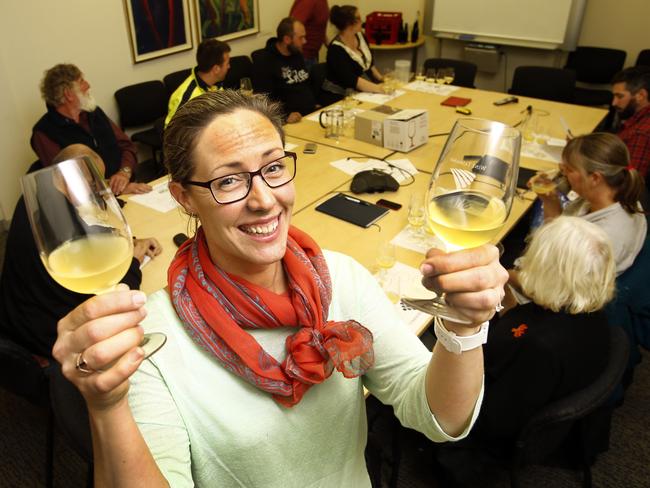
Of course there were also plenty of challenging times, including periods of drought.
But ultimately Kerslake has fond memories of that time on the land, surrounded by her parents and two siblings.
“We were able to have horses and ride motorbikes and things like that as kids, and I also enjoyed growing up in a small community which was really lovely. I do love the smaller community feel. I enjoy visiting big cities but I never feel comfortable there. I’ve always had a really strong connection to the land.’’
Kerslake attended Ouse District High School until the end of Grade 4, and then went to boarding school at St Michael’s Collegiate in Hobart, where her older sister was also a boarder.
She says it was an “excellent academic opportunity”, which helped support and shape her interest in potentially pursuing an agriculture-related career path.
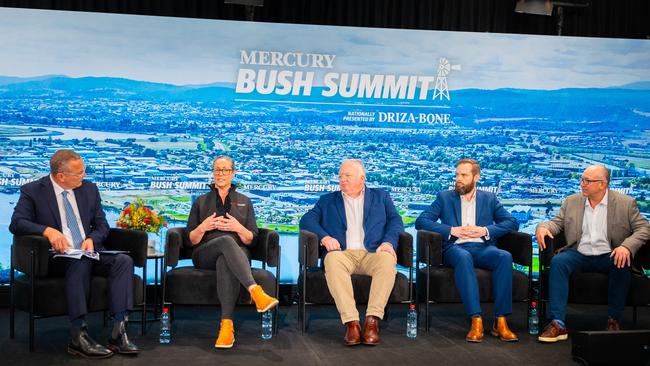
“I was really interested and attracted to the sciences but I was also quite sporty,’’ Kerslake says.
“So, I was tossing up a lot throughout school whether to follow a sports science pathway or an agscience pathway.’’
Agricultural science lessons were shared with students at The Hutchins School, where Kerslake was inspired by “fantastic” teacher Jim Ludwig, who introduced her to a more scientific perspective of farming.
“It gave me a deeper understanding of the practices my family had been doing on the farm over the years,’’ she recalls.
“It was super interesting for me and really piqued my interest.’’
Kerslake was still passionate about sport, and was still travelling nationally and internationally to compete – she later formed part of a gold-medal-winning Australian women’s underwater hockey team at the world championships in Calgary in 2003 – and took a couple of years off studying after finishing Year 12 to travel, and work, and gain some life experience while also trying to decide which career path she should follow.
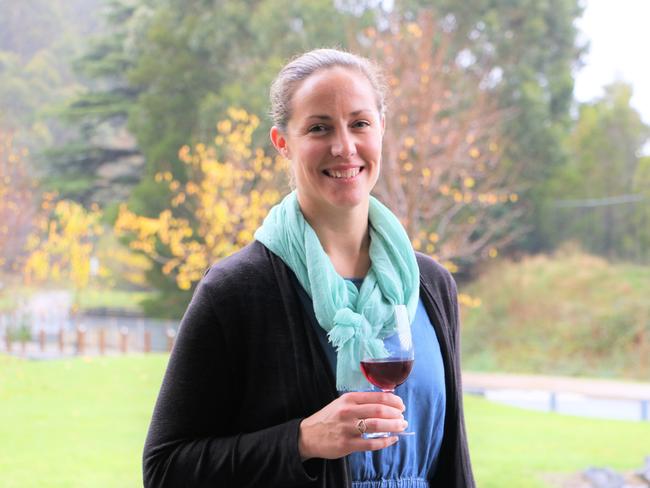
Kerslake then completed a bachelor of agricultural science at UTAS – with her honours year project centred on different ways of drenching merino sheep, and what impact that had on wool quality – but still wasn’t sure what she should do next.
“I still wasn’t 100 per cent certain about what I wanted to do, and mum and dad were sort of thinking of selling the farm at that time and us kids were discussing whether someone should take over the farm,’’ Kerslake recalls.
So, she decided to do some more travelling, and spent 18 months living in New Zealand. “I went for one ski season and stayed for two,” Kerslake laughs – and this unexpectedly inspired a firm new plan for the future.
Kerslake was working in a bar at night, and found the pinot noirs of the Central Otago region fascinating, as, despite all hailing from one region, there were such a variety of different styles and flavours within a single variety.
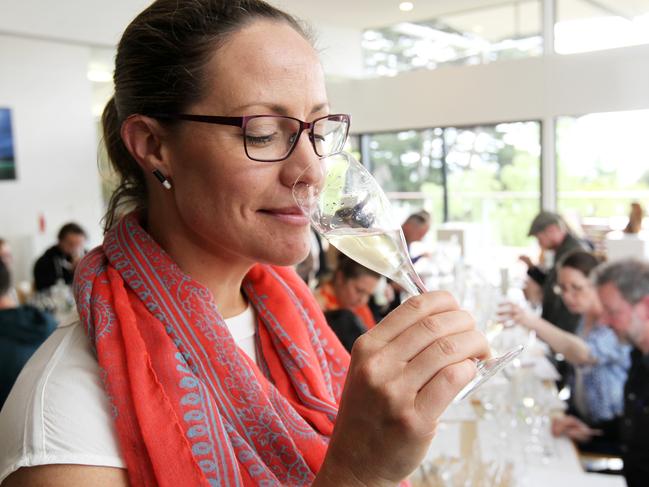
She decided the wine industry would be a good place to apply her agscience skills.
She approached a former lecturer at UTAS to ask his opinion on some post-grad study she was thinking of doing in Western Australia, and that lecturer drew her attention to a PhD scholarship at UTAS with a focus on understanding pinot noir viticulture in cool climates, which Kerslake successfully applied for.
Kerslake loved the practical nature of the project, which gave her the opportunity to learn from internationally renowned viticulturalist Dr Richard Smart and work from a small micro winery on site at Tamar Ridge, on the outskirts of Launceston, “working on solving real life, real world problems” and “nutting our different things you can do in a vineyard and the impact that has on wine quality’’.
After finishing that PhD, an opportunity arose for a postdoctoral position at UTAS, kicking off a 13-year career in academia, as Kerslake worked as a research fellow at the university’s Tasmanian Institute of Agriculture.
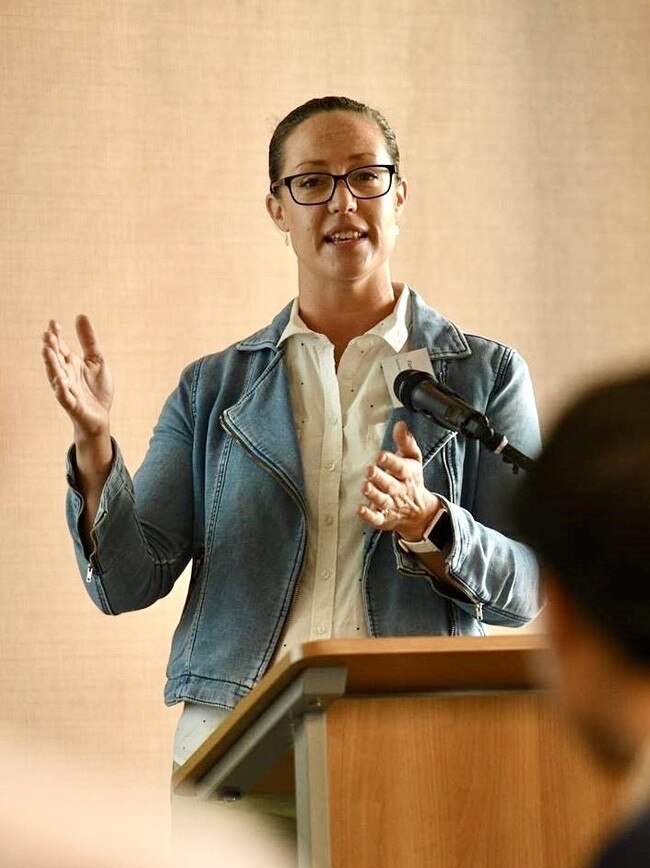
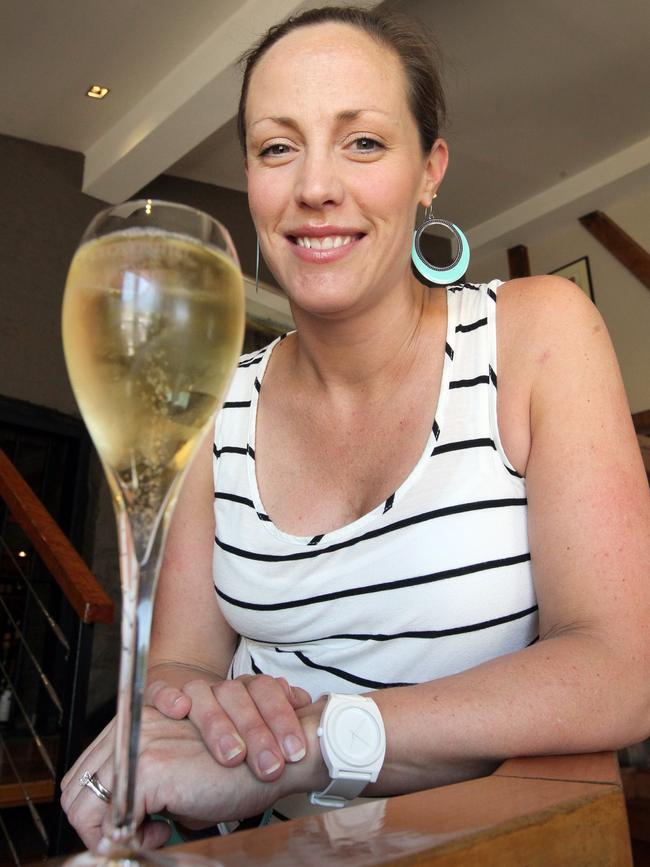
During her academic career, Kerslake delivered internationally recognised research with on-ground impact for Tasmanian wine producers, focusing on quality outcomes from pinot noir and sparkling wine viticulture as well as ways to enhance sparkling wine and cider chemistry. She has presented her research outcomes around the world including the UK, Portugal, France, Canada, USA, Italy, Estonia, Sweden and Denmark. She concluded her time at the university as the head of horticulture at the Tasmanian Institute of Agriculture.
Kerslake was always encouraging academic staff to ensure they had enough industry-relevant knowledge and experience.
So, in 2021, she decided to follow her own advice and return to working in the industry.
Two opportunities presented themselves – one was with Ag Logic, a business built by Reuben Wells, who Kerslake got to know years earlier when they were both viticulture scholarship recipients at UTAS.
And the second was with Fiona Turner, who was running Bitwise Agronomy from her Jinglers Creek Vineyard.
“I couldn’t choose between friends, so I said yes to both of them,’’ Kerslake says.
She says her two roles complement each other, as both see her working with farmers to ensure better outcomes on the land.
Kerslake has a string of professional and personal interests including graduating from the Tasmanian Leaders Program, the Australian Institute of Company Directors and the Superstars of STEM program. She has served on industry boards, and local not-for-profits and was part of the team that was successful in having Launceston internationally recognised as a UNESCO City of Gastronomy.
Kerslake was also instrumental in founding the annual agriCULTURED paddock-to-plate festival in Launceston in August 2021. She was a panellist for the recent Bush Summit event in Launceston. She also previously ran a gourmet walking tour business with her husband, Brock.
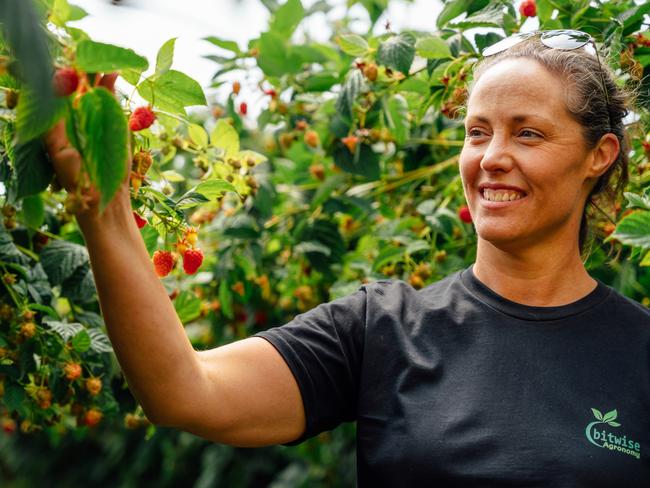
They have two children, aged 10 and 13, and, although they live in suburban Launceston, Kerslake admits she’d “much prefer to be living on the land” and hopes to be back living on the land in the future.
She is excited by the tried and tested technologies now being adopted by farmers in Tasmania and further afield, as well as the emerging technologies that will continue to evolve for generations to come.
“Most farmers are lifelong learners,’’ she says.
“They learn every year because every year is different – whether you want to learn or not the land is giving you lessons. I like to think I’m a lifelong learner as well. I have the approach to being open to opportunities that arise. And that’s what I love about agriculture – it is dynamic and it does change and it does evolve … and making someone’s life a little bit easier with the help of technology is an exciting part of that.’’

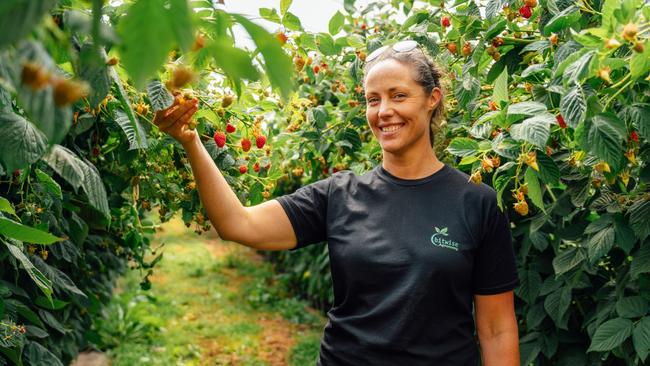
Add your comment to this story
To join the conversation, please log in. Don't have an account? Register
Join the conversation, you are commenting as Logout
Chances of survival could be “low” for missing owner of mystery boat
Police are now scouring the banks of the River Derwent for the missing owner of a boat, which ran aground at Kingston Beach. But concerns are growing the longer he’s unaccounted for.
Mac Point stadium hits sour note for TSO
Another opponent has emerged who is voicing their concerns over the proposed Macquarie Point stadium. Here’s why.